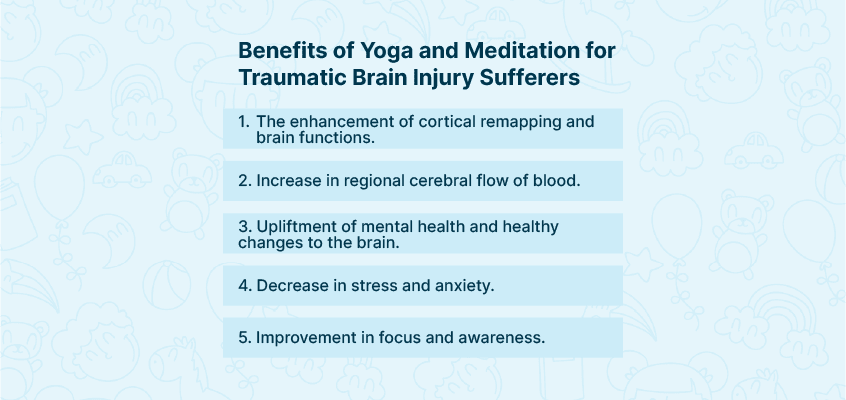Introduction
Traumatic brain injury or intracranial injury occurs in the brain because of damage caused by an external force. The injury could be mild or severe and can result in physical, emotional, cognitive and behavioural changes in an individual. However, practising yoga and meditation has been shown to help heal traumatic brain injuries. Yoga and meditation calm the individual’s mind and help them pay attention to their inner workings, relieving stress and anxiety.
Our Wellness Programs
What is TBI?
Traumatic brain injury (TBI) refers to the abnormal functioning of the brain due to head injury. A violent impact such as a blow or jolt to the head may cause Traumatic brain injury (TBI). It may also occur if an object pierces the skull and enters brain matter. There are four main types of TBIs:
- Concussion: Concussions are the result of severe blows to the head. They often result in headaches, difficulty concentrating, memory lapses, and balance and coordination issues. Concussions are usually temporary brain injuries.
- Contusion: Contusions are prevalent inactive children. They mainly occur due to sharp blows or jolts to the head, causing external injury to the skin and internal damage to brain tissue.
- Penetrating injury: A penetrating injury is a deep wound caused by a foreign object entering the head. Common causes include gunshots, explosive devices, or stabbings.
- Anoxic brain injury: An insufficient supply of oxygen to the brain causes Anoxic brain injury, leading to cell death in the brain. It is mainly associated with strokes.
Looking for services related to this subject? Get in touch with these experts today!!
Experts

Banani Das Dhar

India
Wellness Expert
Experience: 7 years

Devika Gupta

India
Wellness Expert
Experience: 4 years

Trupti Rakesh valotia

India
Wellness Expert
Experience: 3 years
How Yoga and Meditation Help in Traumatic Brain Injury (TBI)
Yoga is therapy for both mind and body. It incorporates breathing and focus techniques, muscle strength, and channelling energy. The practice of pranayama, for instance, draws on different breathing exercises to balance the mind with the body. These varied breathing techniques teach a person ways to calm their minds, focussing on physical movements that relieve stress and anxiety, which is helpful in the process of healing from traumatic brain injuries.
Apart from yoga, meditation can also help establish mind and body tranquillity. Research shows that meditation can help individuals recover from spinal cord and brain injuries. It strengthens concentration, sharpness, and observation by increasing awareness of inner feelings, emotions and thoughts. All this ultimately enhances feelings of inner peace and serenity.
Nowadays, healthcare providers offer yoga and meditation for TBI along with medication. Yoga and meditation for brain injury aid with pain, stress management, and emotional self-regulation. All these contribute to a speedy recovery.
Yoga and Meditation – Mindfulness, Awareness and Being Present
Mindfulness is the ability to stay fully active while maintaining a keen awareness of one’s surroundings. The objective of mindfulness is to observe the minutiae of mental, emotional and physical processes. Meditation helps achieve mindfulness and set up a connection between emotions and anxiety, allowing us to live in the present and overcome the past.
Yoga and meditation for TBI offer the following benefits:
- Stress reduction: Meditation helps reduce overwhelming negative thoughts and reduces stress and anxiety. It teaches a person to relax and focus on inner feelings. Yoga and meditation help achieve a deep state of relaxation by simultaneously exercising the mind and the body. During meditation, the individual focuses their mind away from the outer world to concentrate on the inner self.
- Focus: Regularly Practising yoga and meditation increase stress. It increases the individual’s ability significantly to concentrate effectively for extended periods, leading to greater efficiency and involvement in their lives.
- Enhances memory: One of the primary benefits of yoga, meditation, and mindfulness is strengthening an individual’s working capacity. Mindfulness practices encourage positive attitudes and help minimise negative thoughts and discouragement.
Benefits of Yoga and Meditation for Traumatic Brain Injury Sufferers
The brain is the centre of the human body, and brain injuries can gravely impact the individual’s quality of life. Yoga and meditation are effective therapeutic strategies that connect the body with the mind and help heal brain injury, leading to peace after a traumatic brain injury (TBI).
Research has shown that the regular practice of yoga and meditation for TBI has many benefits, including:
- The enhancement of cortical remapping and brain functions.
- Increase in regional cerebral flow of blood.
- Upliftment of mental health and healthy changes to the brain.
- Decrease in stress and anxiety.
- Improvement in focus and awareness.
How to practice Yoga with TBI?
Yoga and meditation for TBI physically help patients improve muscle coordination and balance. Patients can adopt specific yoga poses to treat traumatic brain injury. These require chairs for balance and support.
The Palm Tree. This simple yoga pose helps one balance on their toes. To perform palm tree:
- Stand behind a chair with one hand resting on the back of the chair.
- Lift the body, standing on the tips of your toes, and hold the position.
- While standing on your toes, lift one arm and hold it straight over the head.
The Tree Pose. This yoga pose helps brain injury patients practice balance, focussing on balancing one leg. To perform tree pose:
- Stand upright near the chair with one arm resting on it.
- Lift the left foot and place it over the calf muscle of the right foot. If this is not possible, place the left heel above the right ankle.
- Maintain this position while lifting the left arm as high as possible. Hold for ten to fifteen seconds.
The Downward Facing Dog. This yoga pose is difficult to perform and not recommended for individuals experiencing dizziness after a head injury. To perform:
- Take the chair and stand straight, facing it.
- Inhale and lift both arms over the head.
- Next, bend the body forward and place hands on the chair’s seat.
- Slowly take your feet backwards and lift the hips until you resemble a downward dog.
- Hold for twenty seconds.
Conclusion
Applying yoga and meditation as therapy is an adjunctive treatment for traumatic brain injury (TBI). These practices help a person strengthen their mind and eliminate negative thoughts. To learn more about incorporating yoga and meditation in one’s everyday life to enhance health and prosperity, please look at the diverse range of online mental health counselling services we offer here.

















